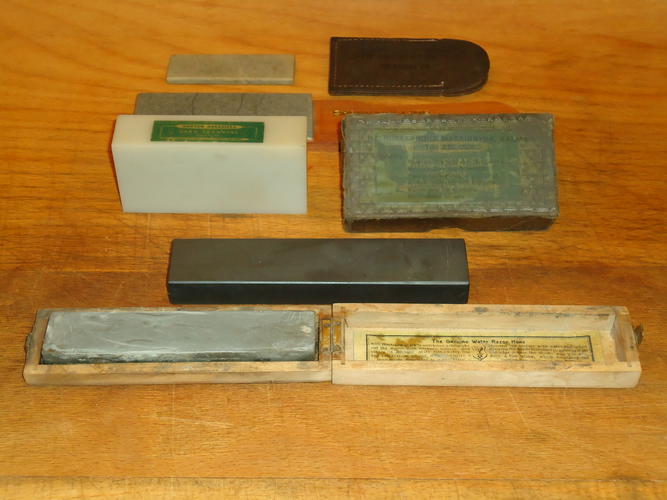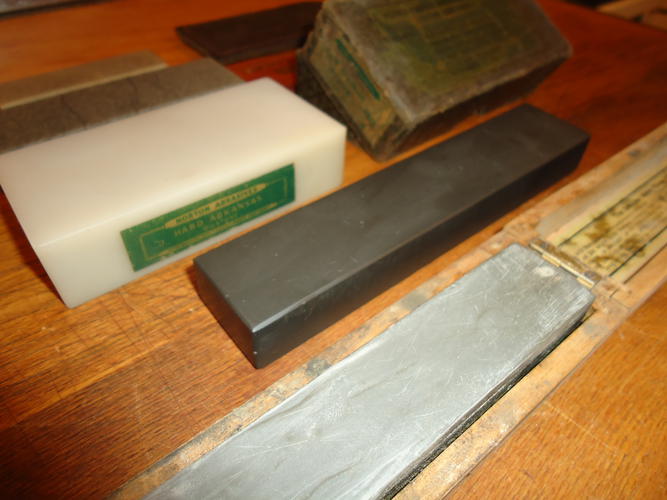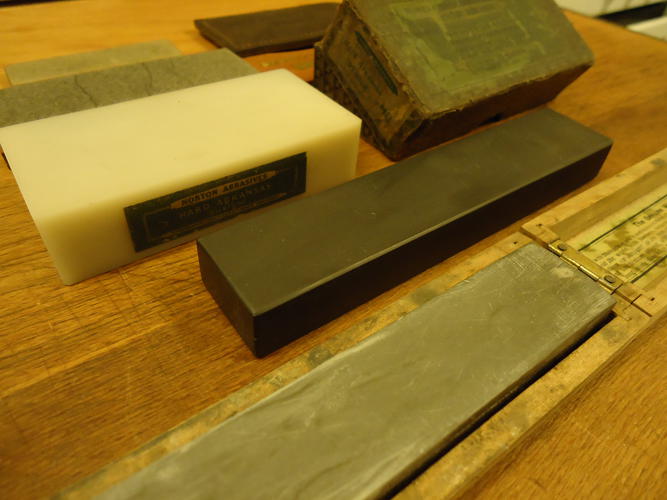Results 1 to 10 of 38
-
11-25-2016, 01:45 AM #1Junior Member

- Join Date
- Nov 2016
- Location
- Sweden
- Posts
- 8
Thanked: 1 Yet another please identify my hone-thread
Yet another please identify my hone-thread
A friend gave me a razor hone some time ago (black stone, second from the bottom), and I'd like to know what kind of stone it is. I added a number of other fairly well known stones for colour reference, and I did weigh and measure all the loose stones to calculate their density.
From top to bottom:
Washita, density ~2,00 (fairly large margin for error, too small to get the accurate weight)
Smiths Soft Arkansas
Norton Hard Arkansas (Translucent, I'd say), density 2,65
Mystery hone, density 2,80
Escher, thurungian if I'm not mistaken.
The mystery hone is dark grey or black, a bit heavier than the translucent arkansas as the density shows, it used to have remains of a label with the word "razor" or something like that but it was removed by the previous owner. Water does not "wet it", it mostly just gets pushed off the stone by the razor when you draw it across. Worked well with oil (WD40).
I am not skilled at sharpening razors (yet), nor do I have a descent strop or stropping compound. (I'm getting there, sooner or later.) I did however make an attempt to hone a few old razors on the hard arkansas, the escher and the mystery hone, the arkansas and escher did make the razors sharp enough for cutting arm hair, the mystery hone gave a clearly better result - not nearly good enough to shave with it, but I'm guessing that's where a strop would make a big diffrence.
Anyone have an idea what kind of hone it might be?



-
11-25-2016, 02:15 AM #2The First Cut is the Deepest!


- Join Date
- Feb 2010
- Location
- Upper Middle Slobovia NY
- Posts
- 2,737
Thanked: 481
Thats a mighty high density there. By looks, I would say a surgical black Ark, but I have never encountered one of that density.
Perhaps it was one of those "For Good Razors" hones? Anybody ever do a density check on theirs?
-
11-25-2016, 03:21 AM #3Historically Inquisitive



- Join Date
- Aug 2011
- Location
- Upstate New York
- Posts
- 5,782
- Blog Entries
- 1
Thanked: 4249
From the description and looks I would think it is highly possible that it is in fact a Black Arkansas.
Density Standards
Soft Arkansas**** **********2.20-2.30*** Specific Gravity
Hard Arkansas*********** * 2.30-2.45****Specific Gravity
True Hard Arkansas***** *2.50 +** * ****Specific Gravity
Colored Translucent**** * 2.50 +**** ****Specific Gravity
Black Arkansas************ 2.50 +**** *** Specific Gravity
-
11-25-2016, 05:32 AM #4Senior Member




- Join Date
- Feb 2013
- Location
- Haida Gwaii, British Columbia, Canada
- Posts
- 14,457
Thanked: 4830
How does density get calculaed
It's not what you know, it's who you take fishing!
-
The Following User Says Thank You to RezDog For This Useful Post:
aaron1234 (11-25-2016)
-
11-25-2016, 05:54 AM #5Senior Member

- Join Date
- Sep 2013
- Location
- NW Indiana
- Posts
- 1,060
Thanked: 246
Density is mass/volume. Specific gravity is density of the item under test/density of water. Density of water is near enough 1g/cm³ so for our purposes density and specific gravity are near enough to be called the same.
The highest density possible for an Ark is something like 2.65 or thereabouts - this is the density of pure void-free quartz/SiO2 - what Arks are made of almost 100%. I would like to hear what method was used to arrive at the figures given for the OP's stones. Measuring with a ruler and cheap postal scale will not give accurate numbers.Last edited by eKretz; 11-25-2016 at 05:58 AM.
-
11-25-2016, 06:25 AM #6
 Yet another please identify my hone-thread
Yet another please identify my hone-thread
Just calculated yesterday, my Trans Ark was around 2.80 so are you sure Eric? Iam sure i calculated correct....
I also dont think you need a hypercalculated ruler, if youre correct on mm that should do it.
I would vote for surgical Black Ark, not too many other possibilities around...███▓▒░░.RAZORLOVESTONES.░░▒▓███
-
11-25-2016, 06:27 AM #7
-
11-25-2016, 06:36 AM #8Senior Member

- Join Date
- Sep 2013
- Location
- NW Indiana
- Posts
- 1,060
Thanked: 246
Yes I'm sure. The only way it could possibly be higher would be if you had a stone with impurities - which is very rare for an Ark. They are usually on the order of 99.5% pure silica. To properly measure density, volume and weight should be measured very closely - digital calipers do nicely - but you need to measure in four places for each dimension and average if the sides aren't parallel. Don't forget that any error in measuring is cubed! This still won't give an accurate measure of volume if the stone is chamfered or if it's porous enough to absorb water. The best way to accurately measure the volume is with a liquid - i.e. water and a burette, but not many have this equipment. Weight to the gram is probably close enough.
I have measured probably 30 hard Arks and never found one over 2.65 S.G.Last edited by eKretz; 11-25-2016 at 06:39 AM.
-
11-25-2016, 06:51 AM #9

Did calculate a Purple La Lune, to prove what unaccury does i took the Values and changed them with reducing around 2mm on one side measurement.....
Normal Calculation
10.1 x 5.1 x 2.1 / 311 gramm = 2.87gr/cm2
Changing values
10.1 x 5.1 x 1.9 / 311 gramm = 3.17 gr/cm2
10.1 x 5.1 x 1.7 / 311 gramm = 3.55 gr/cm2
So the purple Lune fex shows a very high density. Somebody can make a counter measurement on a purple lune?███▓▒░░.RAZORLOVESTONES.░░▒▓███
-
11-25-2016, 06:51 AM #10

One post in. Welcome to SRP. Please introduce yourself further. Density is not the same thing as specific gravity, no? In any case, I'll take the hard Arkansas stone as shown.
Last edited by Brontosaurus; 11-25-2016 at 06:54 AM.
Striving to be brief, I become obscure. --Horace


 17Likes
17Likes LinkBack URL
LinkBack URL About LinkBacks
About LinkBacks






 Reply With Quote
Reply With Quote
